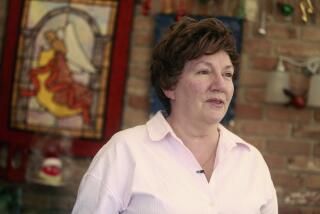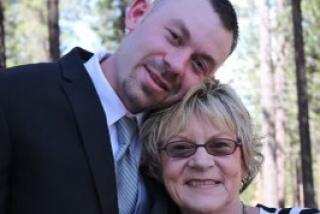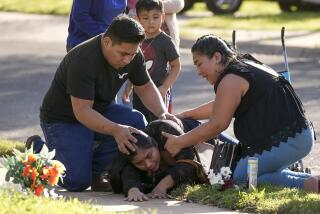Thomas Eric Duncan of Liberia dies of Ebola in Dallas

Thomas Eric Duncan, the first Ebola patient diagnosed in the United States, has died in Dallas after more than a week of hospitalization.
Less than three weeks ago, he came to Texas from Liberia to get married. On Wednesday, Thomas Eric Duncan, the first person diagnosed with Ebola in this country, died amid allegations by his family and prominent African Americans that his care was substandard.
Duncan, 42, had just a few days with his fiancee, Louise Troh, before being hospitalized Sept. 28 and put into isolation. As his condition fluctuated from critical to serious and then back to critical, much of the country became transfixed but also concerned that initial missteps in his treatment might have spread the virus further.
Duncan’s first visit to Texas Health Presbyterian Hospital in Dallas on Sept. 25 ended with him being given antibiotics and sent back to the apartment he was staying in with Troh and three others.
Also on Wednesday, the Dallas County Sheriff’s Department confirmed that a deputy who had come in contact with Duncan’s relatives was now in Texas Health Presbyterian for observation. They described the case as low risk.
Troh, who has not developed Ebola symptoms, said in a statement from quarantine that the family was “in deep sadness and grief.”
“His suffering is over,” she said of Duncan, whom she met in a refugee camp in the 1990s in Ivory Coast, where both had gone to escape Liberia’s then-raging civil war. “Our deepest sympathies go out to his father and family in Liberia and here in America. Eric was a wonderful man who showed compassion toward all.”
Troh and other family members, in addition to some prominent African American leaders, charged that Duncan had been the victim of substandard care.
“When they listen to your accent, they treat you different,” said Troh’s daughter, Youngor Jallah, a 35-year-old nursing home worker who helped care for Duncan before he was hospitalized. “The hospital didn’t treat him right.”
Her husband, Aaron Yah, 43, added: “That’s what everybody thinks. One, he’s from Africa. Two, he didn’t have insurance.”
The Rev. Jesse Jackson and Dallas County Commissioner John Wiley Price, who is also African American, said they suspected that the hospital’s initial failure to treat Duncan as a potential Ebola victim was the result of his race and his financial situation.
“The real elephant in the room is, the man was black, he had no insurance, and therefore he was basically turned away,” Price said. When asked how he knew Duncan didn’t have insurance, Price responded, “If he had pulled out an insurance card, he wouldn’t have had a problem [at the hospital]. I’m willing to stake my life on the fact he didn’t have insurance. He’s from Liberia!”
Jallah confirmed that Duncan was not insured.
Price described Texas Health Presbyterian, a 898-bed hospital, as a “boutique” facility not accustomed to dealing with indigent patients.
At least three other Ebola patients who have been flown to the United States for care have recovered after treatment at other hospitals. Two others remain hospitalized — one in Atlanta and one in Nebraska — after being flown from Africa.
A spokeswoman for Texas Health Presbyterian, where Duncan died, rejected allegations that there was any double-standard in his treatment. “Mr. Duncan was treated the way any other patient would have been treated, regardless of nationality or ability to pay for care. We have a long history of treating a multicultural community in this area,” said spokeswoman Candace White.
Troh, 54, remained quarantined in a Dallas house along with the other three. None has showed signs of Ebola, but because of their proximity to Duncan after he fell ill, they are under orders to remain inside until the virus’ 21-day incubation period ends Oct. 19. An additional 44 people believed to have had contact with Duncan also are being confined.
At a news briefing, Thomas Frieden, director of the Centers for Disease Control and Prevention, repeated what other U.S. officials have said since Duncan’s diagnosis was confirmed: that hospitals here are equipped to handle even this most deadly of viruses and that there is very little chance of this country seeing an Ebola outbreak. He tempered that with a warning: that until the outbreak is stopped in Africa, the United States will not be 100% safe.
Duncan died “despite maximal interventions” from health workers, Frieden said, adding that he hoped this would show the world what a “deadly enemy” Ebola is.
“He is the face that we now associate with Ebola,” he said. “Since the start of the epidemic, 3,742 patients in West Africa have been documented to have died of the disease. We don’t have their faces as prominently in front of us.”
Duncan arrived in Dallas from Monrovia, Liberia, on Sept. 20, with plans to marry Troh and to see Karsiah, the son they had 19 years ago. It would have been the first time father and son had been together since Troh and Karsiah left Africa 16 years ago to start a new life in the United States.
That reunion never took place, and once Duncan was hospitalized and confirmed to have Ebola, he was isolated from all but the masked, gloved and heavily cloaked medical workers trying to save him. While he had been receiving an experimental Ebola drug this week, his liver function had fluctuated and he had been placed on dialysis.
Family members and friends who were able to see him earlier this week via a laptop camera in his hospital room said Duncan was heavily sedated and not responsive. “When we saw him, they only showed us his head, with all the tubes in his mouth,” said Saymendy Lloyd, a close friend of Troh’s.
Still, they had reason to hope. On Tuesday, doctors had said his condition was improving and that his liver functions were better, Lloyd said.
But at 7:51 a.m. Wednesday, hospital officials say, Duncan died of the illness.
“It is with profound sadness and heartfelt disappointment that we must inform you of the death of Thomas Eric Duncan,” hospital officials said in a statement. “Mr. Duncan succumbed to an insidious disease, Ebola. He fought courageously in this battle. Our professionals, the doctors and nurses in the unit, as well as the entire Texas Health Presbyterian Hospital Dallas community, are also grieving his passing.”
Duncan’s family was left struggling to plan a funeral, rather than a wedding.
Duncan told Troh the day he was diagnosed that he regretted exposing her to the virus. Had he known he had Ebola, he said, he would have “preferred to stay in Liberia and died than bring this to you,” Lloyd said. “He told her, ‘I’m so sorry all of this is happening.... I would not put the love of my life in danger.’”
Duncan had never been to the United States before. He and Troh both grew up in Liberia; Duncan was one of seven siblings. After Troh met Duncan in Ivory Coast and had their son, Troh left for the U.S. in 1998 and met another man. Duncan’s mother and other relatives also moved to the U.S., and they stayed in touch with Troh.
Eventually, Duncan decided to come here and began applying for a visa. He had a good reason to come: His son was about to graduate from high school and wanted his father there.
In August, Duncan’s visa was approved. He and Troh had rekindled their relationship, and she helped pay for his plane ticket.
He packed a backpack and a suitcase, and told neighbors he was going to America and would not be back for two years. When he returned, he said, he planned to build a house for his family.
molly.hennessy-fiske @latimes.com
tina.susman@latimes.com
Hennessy-Fiske reported from Dallas and Susman from New York. Times staff writer Matt Pearce in Los Angeles contributed to this report.
More to Read
Start your day right
Sign up for Essential California for news, features and recommendations from the L.A. Times and beyond in your inbox six days a week.
You may occasionally receive promotional content from the Los Angeles Times.








